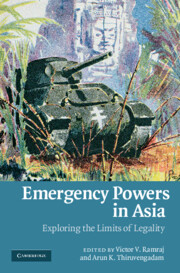Book contents
- Frontmatter
- Contents
- List of contributors
- Preface
- 1 Introduction: emergency powers and constitutionalism in Asia
- PART I Perspectives from legal and political theory
- 2 The emergency powers paradox
- 3 Emergency powers, constitutionalism and legal transplants: the East Asian experience
- 4 Constitution and ‘extraconstitution’: colonial emergency regimes in postcolonial India and Pakistan
- 5 The princely impostor: stories of law and pathology in the exercise of emergency powers
- PART II Postcolonial and post-conflict transitions
- PART III Emergencies, executive power and constitutional order
- PART IV The role of the courts
- Index
- References
2 - The emergency powers paradox
from PART I - Perspectives from legal and political theory
Published online by Cambridge University Press: 04 August 2010
- Frontmatter
- Contents
- List of contributors
- Preface
- 1 Introduction: emergency powers and constitutionalism in Asia
- PART I Perspectives from legal and political theory
- 2 The emergency powers paradox
- 3 Emergency powers, constitutionalism and legal transplants: the East Asian experience
- 4 Constitution and ‘extraconstitution’: colonial emergency regimes in postcolonial India and Pakistan
- 5 The princely impostor: stories of law and pathology in the exercise of emergency powers
- PART II Postcolonial and post-conflict transitions
- PART III Emergencies, executive power and constitutional order
- PART IV The role of the courts
- Index
- References
Summary
Introduction
The basic principles enshrined in the constitutions of many Southeast Asian states bear at least a superficial resemblance to those in their Western, liberal-democratic counterparts. Ostensibly, these principles guarantee fundamental freedoms and place general limits on the use of coercive powers by the state. And as in liberal democracies, emergencies – especially those involving political violence – occasionally pose a serious threat to the constitutional order. Liberal-democratic theories of emergency powers, it seems, should have some relevance for anyone seeking to understand the use of formal or informal emergency powers in Southeast Asia. Yet it is precisely in the context of an emergency that the profound differences between Southeast Asian states and established liberal democracies in the practice of constitutionalism – and, more generally, the aspiration of legality – are exposed.
Theories of emergency powers in the liberal-democratic tradition tend to focus on the capacity of law and formal legal institutions, including the courts, to constrain state power and preserve the normative legal order. This is true not only of the classical theories of legality in times of crisis, but also of contemporary theories of emergency powers. These theories are important and illuminating, but they are limited in one important respect. They typically assume the presence of liberal-democratic institutions, a fully developed legal infrastructure and an entrenched culture of accountability.
Information
- Type
- Chapter
- Information
- Emergency Powers in AsiaExploring the Limits of Legality, pp. 21 - 55Publisher: Cambridge University PressPrint publication year: 2009
